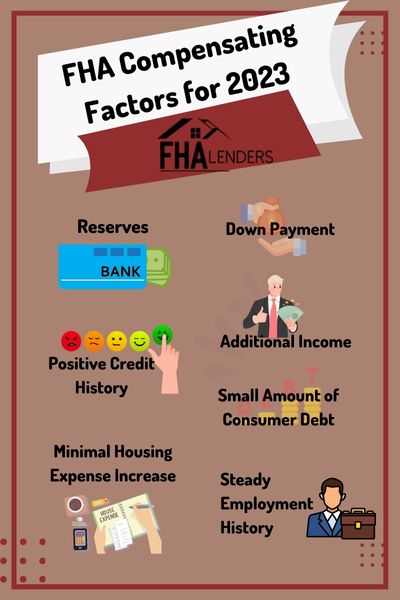
Borrowers who do not receive an automated approval from the lender may need compensating factors to help qualify for an FHA loan. FHA compensating factors help borrowers to qualify when the loan application may not fully meet the standard approval requirements.
We will take you through the various types of FHA compensating factors that can help with your loan approval.
FHA Compensating Factors
These are the most common compensating factors as outlined by the FHA HUD 4000.1 guidelines. Depending upon your scenario, you may need more than one of these factors to secure an FHA loan approval.
Large Down Payment – A larger down payment of 10% or more will compensate for having a high debt to income ratio or poor credit. When a lender sees you are coming to the table with a larger down payment than what is actually required, it will help with your approval. This is especially the case when you also have reserves left over after the down payment.
Additional Income – Having additional income can help as a compensating factor. Additional income could mean you have a low DTI as calculated on the application. It could also be income that was not listed on the application but is likely to continue. Finally, you could use income from someone who will occupy the home and will contribute towards the expenses, but may not be on title or on the mortgage.
Reserves – Reserves are liquid assets that will be left over after the loan has closed. Liquid assets are bank statement balances, stock portfolio, 401k, etc. Not included in reserves are any gift funds being provided by a relative.
Having excess reserves makes lenders feel comfortable that you can still pay the mortgage even if you have a financial setback.
Small Amount of Consumer Debt – Having a small amount of consumer or installment debt on your credit report is a compensating factor. This means the only significant payment you will have is the mortgage. No large credit card bills or car payments to interfere with your ability to make mortgage payments.
Positive Credit History – Individuals who have high credit scores and a positive credit history can use this as an FHA compensating factor. Demonstrating that you are responsible when it comes to credit and your debts sends positive messages and can help with your mortgage approval.
A positive credit history means on time payments, low credit utilization, no collections, and if possible a prior mortgage that has been successfully paid off.
Steady Employment History – Having a steady employment history can go a long way in helping to secure a mortgage approval. Lenders like to see borrowers who have been in their job for a long time or at least in the same industry. No employment gaps and no constant job changes will be important.
When lenders see you have been in your current job for just a few months, and then your prior job for only a few months, it does not make them feel confident in your ability to repay the loan.
Minimal Housing Expense Increase – You may be paying rent right now or have a home now with a mortgage payment. Having little to no housing expense increase can be a positive compensating factor. This means your current payment should not increase much when you have a new mortgage payment. When your payment increases significantly, it is called payment shock and it something lenders frown upon.
If you are having difficulty getting your mortgage approved even with compensating factors, then we may be able to help. Simply contact us here and we can let you know whether your loan scenario can work.
What Others are Saying about FHA Compensating Factors
Eric Jeanette – “Having strong compensating factors is critical in helping to get a borderline FHA loan application approved.”
Gustan Cho – “With two compensating factors, you can go up to a 40% front end DTI, and a 50% back end DTI.”
Sold .com – “Lenders want to know that you are able to responsibly take on debt and pay it back as promised.”
Suggested Reading
